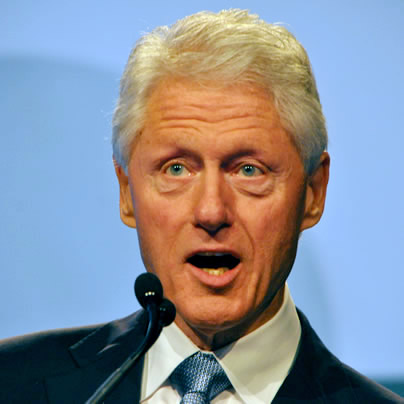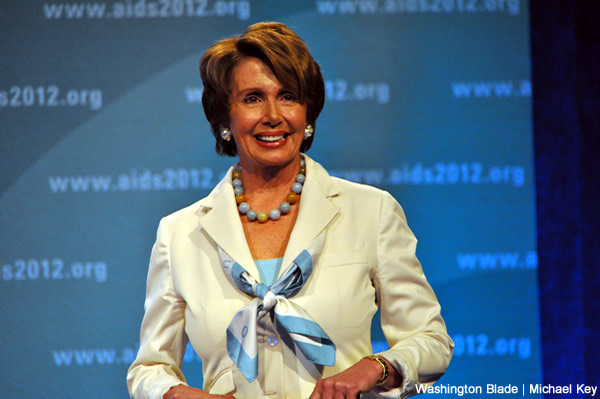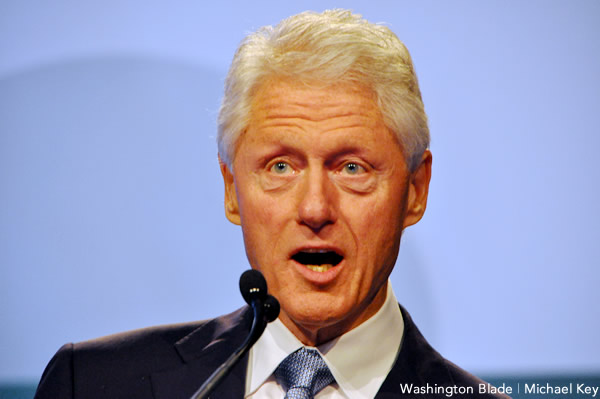Local
Bill Clinton, Pelosi bring AIDS conference to a close
Former president seeks universal access to treatment for people with HIV

Former President Bill Clinton on Friday called for a more effective use of resources in the fight against HIV/AIDS.
“We need a new level of openness about how every last dollar is spent by countries, by governments, by NGOs,” he said during the International AIDS Conference’s closing session at the Walter E. Washington Convention Center.
The Clinton Health Access Initiative through the former president’s foundation in 2010 announced a partnership with the South African government to expand access to HIV testing and antiretroviral treatment. More than 400,000 additional South Africans with HIV had received these drugs within a year of the program’s inception. Clinton further pointed out that the initiative has saved the country roughly $700 million over the last two years.
A CHAI and Center for Global Development study of more than 100 health facilities in Ethiopia, Malawi, Rwanda and Zambia in 2011 found it cost an average of $200 — $682 annually in South Africa because of higher health and labor costs — a year to treat a person with HIV. A President’s Emergency Plan for AIDS Relief analysis that was released during the 2010 International AIDS Conference in Vienna placed this figure at $880 a year.
The World Health Organization estimated that 5.2 million of the 15 million people with HIV globally received treatment at the end of 2009. “There is no excuse for failing to provide treatment for the remaining 10 million people in need,” said Clinton, referring to the goal of universal access by 2015.
The international HIV/AIDS community also seeks to virtually eliminate mother-to-child transmissions — Secretary of State Hillary Clinton on Monday announced that the U.S. government would pledge an additional $80 million to achieve this benchmark as part of a broader $157 million pledge towards what she described as an AIDS-free generation. They have also pledged to reduce new HIV infection rates by 50 percent over the next three years.
The former president acknowledged that the global financial crisis has adversely affected the amount of money that donor countries can give — although he noted that the United Kingdom and Ireland are among those that continue to contribute inspire of austerity measures. He further pointed to the Bill and Melinda Gates Foundation and other private foundations and donors that have increased their support of global HIV/AIDS efforts in recent years.
“There’s an enormous amount of private money being raised and spent and there will be more,” said Clinton. “Governments, even in this difficult time, I believe will do more if we prove we’re maximizing the amount of money they have given.”
The former president noted only slightly more than a quarter of the 1.2 million Americans living with HIV “are getting optimum care.” He further cited statistics that new infection rates among young gay men — and particularly among black men under 30 who have sex with men continue to rise. Clinton also spoke about the epidemic’s continued impact on Latinos, Native Americans, Asians and Pacific Islanders.
“Many of them feel that because of the overall progress made in the fight against AIDS, they’re just going to be left out and left behind,” he said.
Clinton also applauded D.C. for efforts to fight HIV. These include the distribution of more than five million male and female condoms last year and a 72 percent decrease in HIV rates among intravenous drug users between 2007 and 2010. Mayor Vincent Gray reiterated at the AIDS Memorial Quilt on the National Mall on Sunday that no baby has been born with HIV in the city since 2009.
“In this city, government and community leadership has been reinvigorated,” said Clinton. “They are making a different.”
Pelosi: We have an obligation to continue HIV/AIDS fight
In a separate speech, House Minority Leader Nancy Pelosi (D-Calif.) recalled the epidemic’s early impact in San Francisco.
“It was 31 years ago when we first heard in our community that doctors at UCSF (University of California-San Francisco) were seeing unlike anything they’d seen before, symptoms that harkened back to the Middle Ages,” she said. “Many of you could tell this same story. Quickly, AIDS began to take a terrible toll. Soon, we were going to as many as two funerals a day. Quickly we know that this was an emergency and that we had to pull out all the stops.”
Pelosi’s first speech in Congress after she arrived on Capitol Hill in 1987 was about AIDS. She said that some of her fellow lawmakers questioned why she decided to speak about the issue.
“I said: ‘I said it because that’s what I came here to do,’” recalled Pelosi. “But recognize that was the sign of the times in Washington, D.C.”
She said she and other San Franciscans saw themselves at the center of the epidemic.
“We were ground zero, as we saw it, of the AIDS assault — on our health, on our economy and on our community; on the lives of our dear friends,” said Pelosi, who later sewed a patch on the AIDS Memorial Quilt in memory of the flower girl at her wedding who lost her battle to the disease. “With death, denial, and discrimination against those with the disease, AIDS was not only a challenge to our scientific and medical professionals; it was a challenge to the conscience of all of us and it remains so to this day. We knew we had to organize, not just agonize — and organize, not agonize, and organize not agonize we did.”
She specifically cited California Congressman Henry Waxman and the late-Massachusetts Sen. Ted Kennedy for their efforts to secure passage of the Ryan White Care Act in 1990. Pelosi praised Clinton and former President George W. Bush for their commitment to the fight against the global AIDS epidemic. And she applauded President Obama for both signing the health care reform bill and repealing the travel ban for people with the virus.
“On the brink of the AIDS-free generation, we must carry on with determination, hope, and courage,” said Pelosi. “Courage is one of the defining qualities that we always must bring to this. In doing so, we will succeed in turning the tide together. Thank all of you, to every one of you for your leadership, your activism, for your commitment to ending HIV/AIDS once and for all.”

House Minority Leader Nancy Pelosi (D-Calif.) speaks at the International AIDS Conference (Blade photo by Michael Key)
District of Columbia
D.C. Black Pride theme, performers announced at ‘Speakeasy’
Durand Bernarr to headline 2026 programming

The Center for Black Equity held its 2026 DC Black Pride Theme Reveal event at Union Stage on Monday. The evening, a “Speakeasy Happy Hour,” was hosted by Anthony Oakes and featured performances by Lolita Leopard and Keith Angelo. The Center for Black Equity organizes DC Black Pride.
Kenya Hutton, Center for Black Equity president and CEO, spoke following the performances by Leopard and Angelo. Hutton announced this year’s theme for DC Black Pride: “New Black Renaissance.”
Performers for 2026 DC Black Pride were announced to be Bang Garcon, Be Steadwell, Jay Columbus, Bennu Byrd, Rue Pratt and Akeem Woods.
Singer-songwriter Durand Bernarr was announced as the headliner for the 2026 festivities. Bernerr gave brief remarks through a video played on the screen at the stage.
DC Black Pride is scheduled for May 22-25. For more information on DC Black Pride, visit dcblackpride.org.
Virginia
Arlington LGBTQ bar Freddie’s celebrates 25th anniversary
Owner asks public to support D.C.-area gay bars

An overflowing crowd turned out Sunday night, March 1, for the 25th anniversary celebration of Freddie’s Beach Bar, the LGBTQ bar and restaurant located in the Crystal City section of Arlington, Va.
The celebration began as longtime patrons sitting at tables and at the bar ordered drinks, snacks, and full meals as several of Freddie’s well-known drag queens performed on a decorated stage.
Roland Watkins, an official with Equality NoVa, an LGBTQ advocacy organization based in the Northern Virginia areas of Arlington, Alexandria, and Fairfax County, next told the gathering about the history of Freddie’s Beach Bar and the role he said that owner Freddie Lutz has played in broadening the bar’s role into a community gathering place.
“Twenty-five years ago, opening a gay bar in Arlington was not a given,” Watkins told the crowd from the stage. “It took courage, convincing, and a deep belief that our community belongs openly, visibly, and proudly,” he said. “And that belief came from Freddie.”
Watkins and others familiar with Freddie’s noted that under Lutz’s leadership and support from his staff, Freddie’s provided support and a gathering place for LGBTQ organizations and a place where Virginia elected officials, and candidates running for public office, came to express their support for the LGBTQ community.
“Over the past 25 years, Freddie’s has become more than a bar,” Watkins said. “It has become a community maker.”
Lutz, who spoke next, said he was moved by the outpouring of support from long-time customers. “Thank you all so much for coming tonight and thank you all so much for your support over the past 25 years,” he said. “I can’t tell you how much that means to me and how much it’s kept me going.”
But Lutz then said Freddie’s, like many other D.C. area gay bars, continues to face economic hard times that he said began during the COVID pandemic. He noted that fewer customers are coming to Freddie’s in recent years, with a significant drop in patronage for his once lucrative weekend buffet brunches.
“So, I don’t want to be the daddy downer on my 25-year anniversary,” he said. “But this was actually the worst year we’ve ever had,” he added. “And I guess what I’m asking is please help us out. Not just me, but all the gay bars in the area.” He added, “I’m reaching out and I’m appealing to you not to forget the gay bars.”
Lutz received loud, prolonged applause, with many customers hugging him as he walked off the stage.

In an official statement released at the reveal event Capital Pride Alliance described its just announced 2026 Pride theme of “Exist, Resist, Have the Audacity” as a “bold declaration affirming the presence, resilience, and courage of LGBTQ+ people around the world.”
The statement adds, “Grounded in the undeniable truth that our existence is not up for debate, this year’s theme calls on the community to live loudly and proudly, stand firm against injustice and erasure, and embody the collective strength that has always defined the LGBTQ+ community.”
In a reference to the impact of the hostile political climate, the statement says, “In a time when LGBTQ+ rights and history continue to face challenges, especially in our Nation’s Capital, where policy and public discourse shape the future of our country, together, we must ensure that our voices are visible, heard, and unapologetically centered.”
The statement also quotes Capital Pride Alliance CEO and President Ryan Bos’s message at the Reveal event: “This year’s theme is both a declaration and a demand,” Bos said. “Exist, Resist, Have Audacity! reflects the resilience of our community and our responsibility to protect the progress we’ve made. As we look toward our nation’s 250th anniversary, we affirm that LGBTQ+ people have always been and always will be part of the United States’s history, and we will continue shaping its future with strength and resolve,” he concluded.
-

 India5 days ago
India5 days agoActivists push for better counting of transgender Indians in 2026 Census
-

 Advice5 days ago
Advice5 days agoDry January has isolated me from my friends
-

 District of Columbia4 days ago
District of Columbia4 days agoCapital Pride reveals 2026 theme
-

 National4 days ago
National4 days agoAfter layoffs at Advocate, parent company acquires ‘Them’ from Conde Nast




















